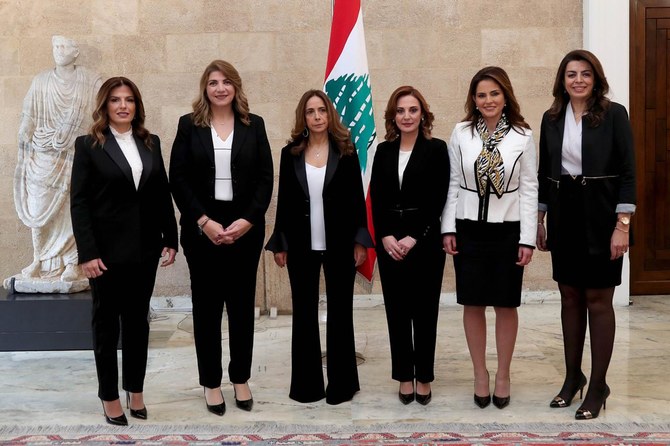
- ARAB NEWS
- 19 Apr 2024

Najia Houssari
BEIRUT: Fifty days ago, six women were nominated to one third of government portfolios in a political and economic situation that no Lebanese politician would be envied for.
Six women holding bachelor and doctorate degrees in management, law, engineering, social sciences, law, political science and French literature were appointed to six ministries: Defense, justice, media, employment, youth and sports, and the displaced. These women had never held political positions before but were chosen by the main political parties.
The number of women ministers is a record for Lebanon.
The new government saw the appointment of Zeina Akar as the first Lebanese and Arab woman deputy prime minister and minister of defense.
So does Prime Minister Hassan Diab’s insistence on the appointment of a large number of women in his government represent changing attitudes toward the role of women in Lebanese society?
Former head of the Lebanese Council of Women and women’s rights activist, Iqbal Doughan, told Arab News that the appointment of the women ministers was the result of 50 years of struggle, and that the international agreements on women’s rights that Lebanon adhered to have boosted the status of Lebanese women.
“Politicians in Lebanon want to show the international community that they are implementing what they have signed on, and they may have done so under pressure, but the aspiration of women is not limited to this. We want to reach parity between men and women in government appointments based on competence,” Doughan said.
She added: “The empowerment of Lebanese women is still deficient,” and that, “a change in prevailing laws, minds and mindset is required.”
“We saw revolutionary women in the protests that invaded Lebanese streets. We were at the forefront and were the engines of the revolution, yet we fear that once the objectives are achieved, women will be put back home, after having been part of the achievements,” she said.
Iman Abdel Nabi Ballout, a student of higher education at the Faculty of Arts and Humanities at the Lebanese University, pointed out in research published in “Awraq Thaqafiyyah” (Cultural Papers), the magazine of the School of Arts and Humanities published in Beirut, that “due to all efforts and transformations that contributed to the endorsement of the Convention on the Elimination of All Forms of Discrimination Against Women and the integration of women’s rights into human rights mechanisms, the Lebanese Parliament passed a law that permits the government to sign the convention. Yet the Lebanese ratification included a reservation that prevents women having equal rights to men regarding granting citizenship to their children and her eligibility to custody of her children, which constitutes an obstacle to guaranteeing full dignity and rights of women.”
Discrimination against women in the workplace represents another obstacle.
According to Ballout there is “discrimination in wages between women and men who do similar work, delayed promotion of women and not allowing them to reach top administrative positions in private and public institutions, denying married women or mothers the opportunity to work in some areas, and discriminating against women in social benefits. The constitution grants equal rights to all Lebanese citizens by a general clause that applies to all citizens, without referring to economic, social and cultural rights.”
Ballout believes that “the status of women in Lebanese politics and public affairs remains modest” for reasons including: “The structural male model, the absence of concepts for human resource development, the lack of societal culture, the lack of freedom of political action, and the spread of corruption in politicians.”
Among the reforms to empower women, a decision was recently issued by the director general of personal status at the Ministry of Interior that allows divorced Lebanese women to obtain a family registration statement that includes the names of their children. This decision aims to provide women with the right to obtain official documents with full information, whatever their family status is.
Randa Yassir, consultant on gender equality in Lebanon told Arab News: “The large and balanced presence of Lebanese women in the current government and the former Hariri government which paved the way for women to take over the ministries of interior and of energy had a positive shocking impact on Lebanon and the Arab world, due to the sensitivity of the ministries headed by women, and some considered it an inspiring experience to break stereotypes not only on the Lebanese level, but also on the Arab level.”
Yassir saw that “political activity needs competence and experience, and women and men alike confront the same political and security conditions that they should handle to achieve any success, but women also confront a male mindset that tries to hold them more accountable than men and puts their performance under more supervision and accountability than their male colleagues.”